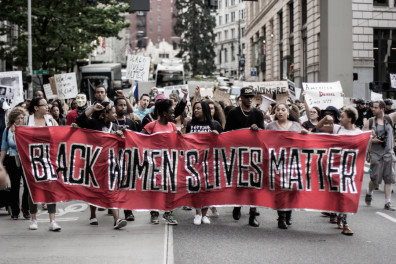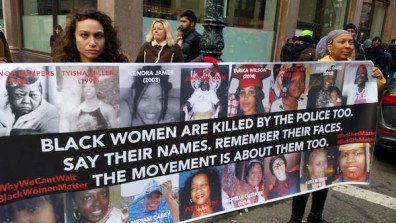Black Women’s Lives Matter Too: the challenges of violence African American women face in home and in society
tay.schueler[http://sgmain.theseattleglobal.netdna-cdn.com/wp-content/uploads/2015/06/BLM-13.jpg]
Being a woman of color in the United States is a challenging position for the fact that not only do these women experience racial discrimination by society but discrimination for their gender as a female. African American women make up eight percent of the U.S. population, yet they are over represented in American jails and prisons as well as over resented in statistics of violence and abuse.
As we know, racism is the systematic discrimination of those outside the majority group believing that they are less than the majority due to certain characteristics. Sexism is the systematic discrimination of women based on their sex. Mix the two together and being an African American woman in American culture results in unreasonable amounts of harm, which we can evidently see today.
Earlier this year in June [2015] a video taken in McKinney, Texas of a police officer using excessive and inappropriate force on a fifteen year African American girl at a pool party went viral. In the video you hear the young girl crying for her mother and her begging him to “leave her alone”. What started all this was when a group of African American youths at a pool party were being called degrading terms by the white adults who were using the pool that day too. After much defense from several of the African American girls, an older white woman smacked one of the girls and the police were called to the scene. What happens when the McKinney Police respond can be seen in this uncensored video:
[http://www.attn.com/stories/1939/mckinney-pool-party-officer-casebolt-resigns]
As it can be seen, Officer Casebolt makes all the African American males drop to the ground with their hands in the air or out where he can see them, even to those who talked back to the officer. He then proceeds to fulfill his ego by using excessive and inappropriate force on a fifteen year old girl in her bikini. As it can be seen in the video, she is standing there and he grabs her, throws her to the ground, pulls a out his gun, and victoriously mounts her with his knee. Did he use that kind of force on the males who based on their height, age, and weight in comparison to the fifteen year old girl would clearly oppose a more serious threat? No. He dominated her because he could. By doing so he showed her and everyone his power, just to fulfill the image of masculinity and as the superior race.
[http://thesexysinglemommy.net/wp-content/uploads/2015/05/black-women-lives-matter.jpg]
The term violence toward women is fairly broad. What comes to mind for most people is sexual violence and assault, which is a fairly large aspect to the concept, but violence toward women can physical, verbal, emotional, psychological—anything that is meant to degrade a woman and make her feel less than a man just to hype up his ego and feel powerful is a form of violence toward women. The National Crime Victimization Survey (NCVS) reported that more than a third of the African American women report cases of violence at some point in their life. In the book, “Arrested Justice: Black Women, Violence, and America’s Prison Nation” by Beth E. Riche (2012), it displays the issue of violence toward African American women where we are not only seeing excessive force and borderline sexual assaults by police officers on these women but we see a large numbers of domestic violence/ intimate partner violence (DV/IPV) cases reported by African American women. It is reported that the second leading cause of death for African American women, ages fifteen to thirty-five, is homicide by an intimate partner (25-26). Time magazine mentions that African American women are an easy target for discrimination due to their racial status and gender. What makes them more susceptible for intimate partner violence is the fact that on average African American women make less money than white men and women, and African American men leading them to sometimes stay in bad relationship for financial stability and providing them with a sense of inferiority. And for those who do seek help, some are not granted the help they need. According to the ACLU, it was noticed that a high number of DV/IPV cases went reported in Detroit but not a thing was done by the Detroit Police Department to help the victims; most of which were African American women. The complete lack of care the police have for cases of DV/IPV, especially when an African American woman is involved, is saddening. This theory is even further cemented in another case presented by the ACLU from Pennsylvania where an African American woman by the name of Lakisha Briggs was mandated an eviction notice by the police because her case of “domestic violence” was a best fit for a “public nuisance”. She was even stabbed by her intimate partner! If the police, the protectors of the people and followers of the law, cannot value the importance of violence toward women regardless of their race, it is impossible to see change and a better future for African American women and women everywhere.
Question Concerning Violence toward African American Women:
- What makes African American women more susceptible to discrimination by police? What threat do they pose? Is it a race thing, a gender thing, or both?
- Why do men use violence against women in general? What are the motives? Why do African American women experience such high levels of violence in comparison to their white counter parts?
- Do you think race plays into whether police respond to DV/IPV cases?
Sources:
Jones, F. (2014, September 10). Why Black Women Struggle More With Domestic Violence. TIME Magazine.
Leveille, V., & Park, S. (2015, August 7). Black Women and Black Lives Matter: Fighting Police Misconduct in Domestic Violence and Sexual Assault Cases. Retrieved September 28, 2015.
Richie, B. (2012). The Problem of Male Violence against Black Women. In Arrested justice black women, violence, and America’s prison nation. New York: New York University Press.

